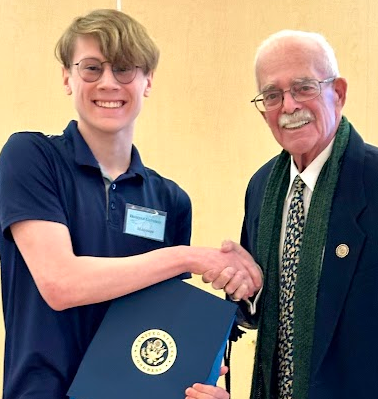In a heartwarming initiative to provide homes for loving furry companions, students have begun taking charge and getting involved in the community to help find animals homes. The not-for-profit organization Wolf Trap Animal Rescue (WTAR) works tirelessly to rescue pets who are at risk of neglect, homelessness and euthanasia from shelters in southern states. WTAR’s goal is to transport, foster and find forever homes for rescued pets. In order to function they rely heavily upon local volunteer families who are willing to open their homes to these animals before they can be adopted. Every person that fosters an animal wants to get the animal adopted, for that to happen they are given all supplies needed for a three week foster period. Sophie Lillienthal (‘24) and her family have been fostering dogs for WTAR for the past six years.
“I think my family is impacting the community by giving these dogs a place to stay and by volunteering for WTAR when they are in need, which gives these dogs a chance to have a happy and healthy rest of their life and get them a home that will forever love them,” Sophie Lilienthal (‘24) said.
For every person who volunteers to foster with WTAR, a rescued pet is brought to Northern Virginia from southern states. With WTAR, there are two different types of fostering: Basic Foster, where a person volunteers to foster any pet during a time that works with their schedule, and Bespoke Foster, designed to give those with special requirements or restrictions priority in choosing the animal and time period they foster for.
It’s common for foster animals to need rehabilitation after being rescued. As foster pets, these animals may have never lived inside a house or have suffered from abuse. Because of this, foster animals require extra care, attention and training, which makes fostering a full-time job.
“Some obstacles me and my family have while fostering is when the puppy doesn’t sleep well which wakes us up through the night and having to clean up after the puppy constantly especially if it’s not potty trained,” Sophie Lilienthal (‘24) said.
Students can get involved in several ways: they can encourage their families to foster a rescue or volunteer for adoption events at the Tysons Corner PetSmart. Unsupervised volunteers must be 17 and can assist at adoption events by helping to set up, check-in fosters, monitor puppies and direct interested adopters. On transport days volunteers are needed to check in and assist with veterinarian related activities. WTAR then works with local businesses to provide puppy therapy to their associates where volunteers are needed onsite to help assist with safe handling of puppies. Students under 17 can help by setting up collection efforts for the organization’s wishlist and delivering them to the WTAR events. Advocating for the work that the WTAR does is also helpful. Students who are active on social media can share the organization’s messages and promote their favorite shelter animals.
“The easiest way to start, I’d say, is to foster the older dogs first because they are easier to handle and then next time you can try fostering a puppy, make sure you have enough space for the dog like a space they can play in and have a crate for them to sleep in, and also make sure you have easy access to outside for potty training,” Sophie Lilienthal (‘24) said.



